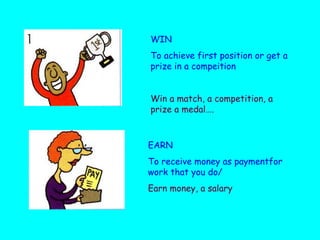Confusing verbs
- 1. WIN To achieve first position or get a prize in a compeition Win a match, a competition, a prize a medal…. EARN To receive money as paymentfor work that you do/ Earn money, a salary
- 2. HOPE To want something to happen Hope to win, to pass, WAIT To allow time to go by, until someone comes, something happens… Wait for the bus, for someone…
- 3. Look like (+ noun) To have similar appearance To look like your mother, an actor, a princess LOOK ( + adjective ) To appear or seem Look happy, sad, well
- 4. WEAR To have clothing, jewellery etc on your body To wear clothes, make up, a ring CARRY To transport or take something from one place to another Carry one bag, books…
- 5. WATCH To look at something for a period of time, especially something which is changing or moving To watch TV, a film, a match… LOOK AT To direct your eyes in order to see. Look at a photo, the board…
- 6. KNOW To be familiar with or to have experience or understanding of somehing or someone To know somebody, someone… MEET To see and speak to someone for the first time/To come together with someone intentionally To meet a friend….
- 7. MAKE To produce something, often using a particular substance or material Make a cake , a noise, a bed, a phone call, choice, coffee, comment, an exception, a guess, a joke, a trip, friends… DO To take action, deal with something Do a composition, a course, an exam, exercise, a service, sport






